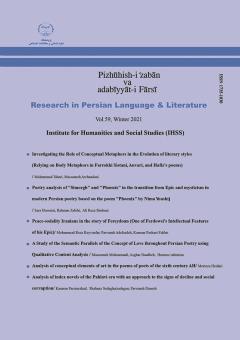Peace-sodality Iranians in the story of Fereydoun (One of Ferdowsi's Intellectual Features of his Epic)
Subject Areas : Research in Iranian classical literaturemohammad reza Keyvanfar 1 , Parvaneh A’del Zadeh 2 * , kamran pashaei fahkri 3
1 - PhD Student, Persian Language and Literature, Islamic Azad University, Tabriz Branch, Iran.
2 - Associate Professor, Department of Persian Language and Literature, Islamic Azad University, Tabriz Branch, Iran.
3 - Associate Professor, Department of Persian Language and Literature, Islamic Azad University, Tabriz Branch, Iran.
Keywords: Epic literature, Shahnameh, Ferdowsi, Peace-sodality, Fereydoun story.,
Abstract :
This article seeks to examine how the Iranian heroes think about peace in Fereydoun story. In this story, several peaceful methods are discussed. The wide distribution of wealth among the needy by Faraanak, the division of the world into three parts and pluralism in the method of governance, and the avoidance of individuality in the division of the world, which is the work of Fereydoun, Emphasis on dialogue in resolving conflicts among heroes and relying on finding a solution to peace and absolute rejection of violence, avoiding the use of military force to resolve disputes, not belonging to the world and avoiding stubbornness and struggle to stay in the power that is the characteristic of Iraj in front of his brothers, paying special attention to justice, and avoiding oppression and tyranny in Fereydoun's actions and speech. What Fereydoun has benefited from, as well as the actions of the words and thoughts of the Iranian heroes in Fereydoun's story, are in line with today's peaceful views.
ابراهیم گل، علیرضا و سیامک کریمی (1396) «دیالکتیک صلح و بربریت مطالعه و نقد نظریۀ لیبرالی حقوق بینالملل»، نشریه مطالعات حقوق عمومی، دورۀ چهل و هفتم، شمارۀ اول، صص 177- 200.
اِته، هرمان (1356) تاریخ ادبیات فارسی، ترجمۀ رضازاده شفق، تهران، بنگاه ترجمه و کتاب.
احمدی، اسماعیل و مجتبی مقصودی (1396) «مطالعه و صلح در خاورمیانه»، ماهنامۀ پژوهش ملل، دورۀ سوم، شمارۀ 26، صص 9-36.
باقری، سعید و سید صادق حقیقت (1392) «نظریه جنگ عادلانه در فلسفه سنت آگوستین»، غربشناسی بنیادی، سال چهارم، شمارۀ دوم، صص 23-50.
حمیدیان سعید (1374) شاهنامه فردوسی متن انتقادی بر اساس شاهنامه، چاپ مسکو، چاپ دوم، قطره.
خالقی مطلق، جلال (1381) «عناصر درام در برخی از داستان¬های شاهنامه» مجموعه پژوهش-های تازه تحت عنوان کلی تن پهلوان و روان خردمند، به کوشش شاهرخ مسکوب، تهران، طرح نو، صص 63-93.
سرّامی، قدمعلی (1373) از رنگ گل تا رنج خار، چاپ دوم، تهران، علمی و فرهنگی.
شمیسا، سیروس (1375) سبک¬شناسی شعر، تهران، میترا.
------------- (1387) انواع ادبی، تهران، میترا.
صفا، ذبیحالله (1392) حماسهسرایی در ایران، چاپخانه سپهر تهران، گفتار سوم، تهران، امیرکبیر.
فردوسی، ابوالقاسم (1366) شاهنامه (دفتر یکم و دوم و پنجم)، تصحیح جلال خالقی مطلق، نیویورک، Bibliotheca Persica.
قبادی، حسینعلی (1394) «پیامهای جهانی فردوسی و جهان عاری از خشونت»، سازمان فرهنگ و ارتباطات اسلامی، سال اول، شمارۀ دوم، صص 1-20.
مسکوب، شاهرخ (1381) «تأملی در اخلاق از اوستا به شاهنامه»، مجموعه پژوهش¬های تازه تحت عنوان کلی تن پهلوان و روان خردمند، به کوشش شاهرخ مسکوب، تهران، طرح نو، صص 225-244.
مطهری، مرتضی (1377) مجموعۀ آثار، تهران، صدرا.
میرزا ملااحمد (1382) «جنگ و صلح در شاهنامه فردوسی»، نامۀ پارسی، سال هشتم، شمارۀ اول، صص43-85.
هانری دوفوشکور، شارل (1381) «اخلاق پهلوانی و اخلاق رسمی در شاهنامه»، مجموعه پژوهش¬های تازه تحت عنوان کلی مجموعۀ تن پهلوان و روان خردمند، به کوشش شاهرخ مسکوب، ترجمۀ بنادرزاده، تهران، طرح نو، صص 10-17.

